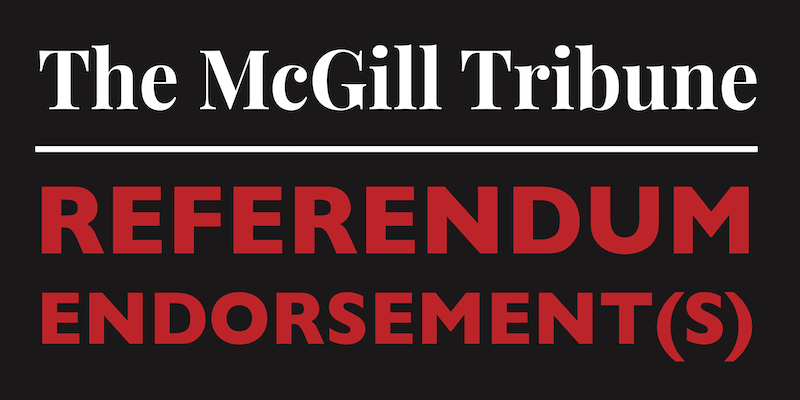Creation of French Accessibility Fee: No
The stated goal of this semesterly $0.25 non-opt-outable fee is to promote advocacy, accessibility, and student rights for both Quebecois and international francophone students. If passed, an additional annual $12,000 would be added to the Commission des affaires francophones’ budget—but only five per cent and 20 per cent would go toward advocacy and promotion of francophone student clubs, respectively. An overwhelming 40 per cent would go toward the promotion of French culture on campus, which would primarily include a French culture week and Francofête, a week-long celebration of the language. Should the referendum question fail, services under the Commission des affaires francophones would still be able to run, albeit with more difficulty in the case of hosting those larger events. The distribution of the new budget is idealistic at best; with the largest cut of the budget going toward French events instead of promotion of student services and student accessibility, the Tribune has chosen not to endorse this fee.
Increase of the SSMU Membership Fee: Yes
If approved, this non-opt-outable fee increase of $1.20 each semester will help fund fair wages for legislative councillors and student senators. The SSMU Membership Fee had remained the same from 2007 to 2019, and in 2019 the Society increased the fee in order to hire more staff, citing SSMU’s growing scope. By offering fair compensation for labour, leadership positions will become more accessible to a wider range of students in SSMU, potentially encouraging more diverse student representation. As well, the fund sustains vital student safety programs like WALKSAFE and Drivesafe, reasons that further support upholding and increasing the fee.
Creation of Dialogue Telemedicine Service Fee: Yes
If passed, this question would create an opt-outable fee of $44.85 for full, year-round access to Dialogue’s 24/7 telemedicine services. It would also ensure the longevity of the program, securing the fee’s existence through 2027. Dialogue’s services were first made available to those on the SSMU health plan in 2020, following the onset of the COVID-19 pandemic, and, according to the referendum motion, have been heavily used. Considering the demonstrated inefficiency and unreliability of the Wellness Hub over the past few years, the stress the pandemic has placed on the health-care system, and the high out-of-pocket expense of medical care for those without a RAMQ card, this fee would make basic essential medical care more accessible to students. Further, those who do not feel they would benefit from Dialogue’s services can simply opt-out of the fee.
Creation of the MUSTBUS Fee: Yes
McGill University Student Transport (MUSTBUS) is a student-run transit cooperative offering trips between Montreal and New York at a reduced cost. While MUSTBUS became a SSMU Independent Student Group in Winter 2021, they do not currently receive any funding from student fees. The proposed opt-outable fee of $2.00 per semester would be used to help subsidize trips and ensure the co-operative can remain in service long-term. With the help of the funds, the group plans on expanding to include Toronto, Boston, and Ottawa routes in the future. Considering the high cost of VIA Rail and Amtrak train tickets, this service would help keep trips affordable for students wishing to travel to see family and friends, to seek professional opportunities, or simply to spend a weekend outside Montreal.
Creation of Student Support Fee: No
If passed, this opt-outable fee of $9.99 would provide students access to Calm, Grammarly, and Udemy for one year through Student Support—a for-profit start-up. This fee would remain in place for one year only to test usage rates and gauge whether or not to put the fee up for a five-year term at next year’s referendum. Student Support has come under scrutiny for a lack of transparency with their finances, promotional strategies, and usage rates at various Canadian universities. Given the company’s spotty track record, it is not worth the risk. In addition, there is a free version of Grammarly available and the Calm app’s features are not universally suited tools for mental wellness. Instead of being outsourced to large for-profit corporations, this money could be better invested in academic and mental health support services at McGill.
Creation of Black Affairs Fee Levy: Yes
The Black Affairs Fee Levy would amount to an non-opt-outable fee of $1.50 per semester, $0.75 per semester for part-time students, to enhance and fund the institutional capacities of the recently formed Black Affairs committee and Black Affairs commissioner position. The fee would go toward paying new and existing staff members, supporting student initiatives in and beyond Black History Month, helping open a new Black student space, and bolstering relationships with community organizations and businesses that serve Black and racialized people. This fee is an important financial step forward to ensure support for Black students and anti-racist advocacy at McGill.
Palestine Solidarity Policy Referendum Question: Yes
If approved, the Students’ Society of McGill University would adopt the Palestine Solidarity Policy. This policy mandates that SSMU publicly condemn the harmful surveillance of Palestinian and pro-Palestine students, issue at least one statement every semester affirming solidarity in the fight against apartheid in Palestine, and create a Palestine Solidarity committee. Additionally, it mandates the boycott and complete divestment of SSMU from all corporations complicit or participating in settler-colonial apartheid in Palestine and directs SSMU to demand the same from the McGill administration. Considering the documented difficulties student organizations face in passing motions supporting Palestine—such as the five-month delay approving the Divest for Human Rights Policy—SSMU’s commitment to long-term support is necessary. This policy is imperative to institutionalizing SSMU’s support for Palestinian students and concretizing their stance against settler-colonial apartheid.








